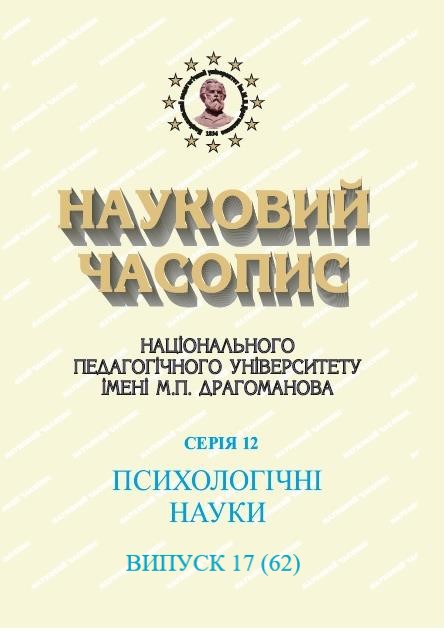THE STUDENTS’ GENDER-CHARACTEROLOGICAL PECULIARITIES AND THEIR IMPACT ON THE PANDEMIC COVID-19 EXPERIENCE
DOI:
https://doi.org/10.31392/NPU-nc.series12.2022.17(62).03Keywords:
gender, character trait, accentuation, pandemic COVID-19, experience, student.Abstract
The aim of the study is to determine the peculiarities of the character traits level and to identify their impact on the pandemic COVID-19 experience in students’ female and male subsamples. Methods: Leonhard-Shmishek’s characterological questionnaire, “The pandemic COVID-19 experience” questionnaire (Martsynkovskaya & Tkachenko), methods of mathematical statistics. The results show that the students’ character traits manifest themselves in different structures of the girls’ and boys’ “group portraits”. Six of ten studied character traits (hyperthymia, emotiveness, exaltation, pedantry, anxiety, demonstrativeness) have statistically meaningful differences in their levels in boys and girls. The traits of emotiveness, exaltation, and pedantry construct the triad with emotional orientation, which dominates among girls. The traits of hyperthymia, cyclothymia, and excitation make the triad with a deedful orientation and dominate among boys. It has been set that the pandemic COVID-19 experience is influenced both by gender-independent character traits (pedantry and anxiety) and gender-dependent ones (rigidity in girls; emotiveness, exaltation, dysthymia, hyperactivity in boys). Calculated meaningful correlations show that girls’ rigidity, pedantry, anxiety, and boys’ emotiveness, pedantry, dysthymia, and exaltation enforce their pandemic COVID-19 experience. Among revealed meaningful correlations is one negative, which indicates that boys’ hyperactivity reduces their pandemic COVID-19 experience. The boys’ character traits have a stronger influence on the pandemic COVID-19 experience (five significant correlations) than girls’ character traits (three significant correlations). It is revealed that girls’ accentuated character traits both occur three times more often and moreover paradoxically weaker influence girls’ COVID-19 pandemic experience than boys’ middle-level traits. Regarding the obtained data on the stronger influence of character traits on the boys’ experience of the COVID-19 pandemic, it is obvious that appropriate psycho correction and psychotherapy with young men require longer and more persistent work, associated with the difficulties of influencing such stable personality’s qualities as character traits.
Literature
- Емельянцева, Т.А., Смычек, В.Б., Мартыненко, А.И., Захаревич, О.Ю., & Лакутин, А.А. (2021). COVID-19 и психические расстройства: анализ данных и перспективы. Психиатрия, психотерапия и клиническая психологияю, 12,(3), 383‒390.
- Костіна, Т.О. (2020). Криза в умовах карантину: нові гендерні перспективи. Наукові записки Національного університету «Острозька академія». Серія «Психологія», 11, 162–166 . doi: 10.25264/2415-7384-2020-11-162-166.
- Максименко, С.Д. (2020). Соціальні та природні екстремальні виклики ‒ психологічний захист населення. Психологія і педагогіка у протидії пандемії COVID-19: Інтернет-посібник. В.Г. Кременя (Ред.). Київ : ТОВ «Юрка Любченка».
- Марцинковская, Т.Д., & Ткаченко, Д.П. (2021). Опросник «Переживания пандемии COVID-19». Новые психологические исследования, 1, 54‒68. doi: 10.51217/npsyresearch_2021_01_01_03
- Москальова, A.С., & Moскальов M.В. (2014). Методи психодіагностики у навчально-виховному процесі. Навчальний посібник. Київ : УМО НАПН Українa.
- Хомич, Г.О., & Войтенко, О. (2021). Емоційні переживання та психологічний супровід дорослих у період пандемії. Науковий часопис НПУ імені М.П. Драгоманова. Серія 12. Психологічні науки, 15(60), 111‒119. Київ : Вид-во НПУ імені М.П. Драгоманова. https://doi.org/10.31392/NPU-nc.series12.2021.15(60).11
- Bohlken, J., Schömig, F., Lemke, M.R., Pumberger, M., & Riedel-Heller, S. G. (2020). COVID-19 Pandemic: Stress Experience of Healthcare Workers. A Short Current Review. Psychiatrische Praxis, 47(04), 190‒197. doi: 10.1055/a-1159-5551.
- Yevdokimova, O., & Okhrimenko, I. (2020). Coping Strategies for Overcoming Stress in Atypical Situations. Broad Research in Artificial Intelligence and Neuroscience, 11(2Sup1), 56‒63. doi: 10.18662/brain/11.2Sup1/94

